|
|
|
Sort Order |
|
|
|
Items / Page
|
|
|
|
|
|
|
| Srl | Item |
| 1 |
ID:
140001
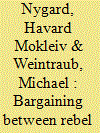

|
|
|
|
|
| Summary/Abstract |
Although military cooperation among rebel groups in multi-party civil wars could help rebels defeat or extract concessions from an incumbent government, violent conflict among rebel groups is empirically prevalent. Why do rebel groups in multi-party civil wars choose to fight one another? This article models the strategic dilemma facing rebel groups in multi-party civil wars as an alternating-offer bargaining game of incomplete information with an outside option. The game-theoretic model explores the relationship between the status quo distribution of power among rebel groups, the costs of fighting, and the likelihood that one rebel group will opt to unilaterally end bargaining over a set of goods, such as access to supply routes, natural resources, and control over civilian populations. We show that the likelihood of violent conflict between rebel groups is lowest when the status quo distribution of benefits reflects the existing distribution of power.
|
|
|
|
|
|
|
|
|
|
|
|
|
|
|
|
| 2 |
ID:
186090
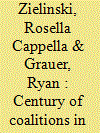

|
|
|
|
|
| Summary/Abstract |
Under what conditions do battlefield coalitions fight as greater or less than the sum of their parts? Introducing the Belligerents in Battle dataset, which contains information on actors fighting in 492 battles during interstate wars waged between 1900 and 2003, we present, for the first time, a portrait of the universe of battlefield coalitions. Battlefield coalitions win more often and suffer fewer casualties than belligerents fighting alone. Battlefield coalitions including forces fielded by the United States, states with pre-existing treaty agreements, and democracies are particularly powerful. By contrast, battlefield coalitions that include non-state actors lose the majority of their fights.
|
|
|
|
|
|
|
|
|
|
|
|
|
|
|
|
| 3 |
ID:
109027
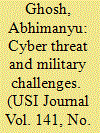

|
|
|
| 4 |
ID:
103056
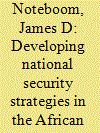

|
|
|
| 5 |
ID:
110450
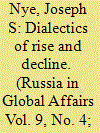

|
|
|
|
|
| Publication |
2011.
|
| Summary/Abstract |
In a world of new transnational challenges created by non-state actors the United States and Russia have much to gain from working together to cope with these new challenges. In short, the U.S. has more to gain from partnership with a strong reformed Russia rather than a weak declining Russia.
|
|
|
|
|
|
|
|
|
|
|
|
|
|
|
|
| 6 |
ID:
110006
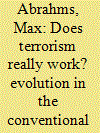

|
|
|
|
|
| Publication |
2011.
|
| Summary/Abstract |
The basic narrative of bargaining theory predicts that, all else equal, anarchy favors concessions to challengers who demonstrate the will and ability to escalate against defenders. For this reason, post-9/11 political science research explained terrorism as rational strategic behavior for non-state challengers to induce government compliance given their constraints. Over the past decade, however, empirical research has consistently found that neither escalating to terrorism nor with terrorism helps non-state actors to achieve their demands. In fact, escalating to terrorism or with terrorism increases the odds that target countries will dig in their political heels, depriving the non-state challengers of their given preferences. These empirical findings across disciplines, methodologies, as well as salient global events raise important research questions, with implications for counterterrorism strategy.
|
|
|
|
|
|
|
|
|
|
|
|
|
|
|
|
| 7 |
ID:
139572
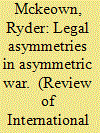

|
|
|
|
|
| Summary/Abstract |
Standard conceptions of the relationship between international law and war in International Relations (IR) mostly oscillate between the sceptical view that law is mostly irrelevant in times of conflict, and the optimistic view that law is a meaningful moral standard that effectively constrains violence. Modern asymmetric conflicts between liberal democratic states and non-state actors such as the Taliban, al-Qaeda, or Hamas challenge these conceptions, however, as they are at once increasingly legal and extremely violent. Drawing inspiration from IR and International Law (IL) scholarship from multiple theoretical paradigms, this article examines the legal asymmetries before, during, and after asymmetric conflict. Noting that law is at once a useful tool and a strong normative force, it argues that a good understanding of legal asymmetries can supplement existing theories of asymmetric war, continue the dissolution of false dichotomies and open up interesting avenues of research in IR, and help both scholars and policymakers understand how international law influences modern asymmetric conflict against non-state actors.
|
|
|
|
|
|
|
|
|
|
|
|
|
|
|
|
| 8 |
ID:
110778
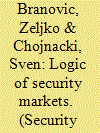

|
|
|
|
|
| Publication |
2011.
|
| Summary/Abstract |
This article presents a theoretical framework with which to discuss how non-state modes of security governance evolve in the context of state failure and/or collapse. To address this issue, we present the logic of security markets, which assumes that the evolution of security governance by non-state groups in failed states is a function of both resource availability and the strategies that armed groups apply to extract resources from the civilian population. Axiomatically, we expect that in the short term the central purpose for the use of force is survival and achieving the ability to finance one's capabilities to use force, although ultimately this also includes the seizure and control of territory. The main argument is that the changing competitive conditions in security markets - which we measure in terms of the total number of violent groups and their organizational design, size and strength - explain the rationales behind the decisions of armed groups either to use violence against the civilian population or to invest in the provision of security.
|
|
|
|
|
|
|
|
|
|
|
|
|
|
|
|
| 9 |
ID:
123783
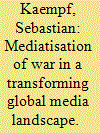

|
|
|
|
|
| Publication |
2013.
|
| Summary/Abstract |
Before the rise of digital new media technology in 2002, 'old' media at its heart displayed a fundamental division between sender and receiver, a division which for a long time had structurally, materially and politically conditioned the nature of the relationship between 'old' media and war. Within the recently emerging digital new media technology, however, this age-old separation between sender and receiver has been eroded. Thus, alongside traditional media platforms, an entirely new form of media technology has arisen. This development has transformed the hitherto multipolar nature of the old media landscape and has led to a heteropolar global media landscape, in which the relationship between media and war has been altered. By exploring how digital new media poles are forming and old media poles are evolving, this article examines how this seismic shift in the global media landscape requires a redefinition of the understanding of the nature of the relationship between media and conflict today.
|
|
|
|
|
|
|
|
|
|
|
|
|
|
|
|
| 10 |
ID:
117412
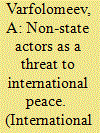

|
|
|
|
|
| Publication |
2012.
|
| Summary/Abstract |
INTERNATIONAL AFFAIRS is one of the most critical domains of modern public relations. Moreover, we use the definition of "critical" in this context not so much in the sense of "vitally important" as per its meaning, which is "full of criticism." Perhaps it is only medicine that in the consciousness of the man in the street is as "understandable" to all and criticized by all.
|
|
|
|
|
|
|
|
|
|
|
|
|
|
|
|
| 11 |
ID:
109874
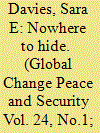

|
|
|
|
|
| Publication |
2012.
|
| Summary/Abstract |
Since the revisions to the International Health Regulations (IHR) in 2005, much attention has turned to how states, particularly developing states, will address core capacity requirements attached to the revised IHR. Primarily, how will states strengthen their capacity to identify and verify public health emergencies of international concern (PHEIC)? Another important but under-examined aspect of the revised IHR is the empowerment of the World Health Organization (WHO) to act upon non-governmental reports of disease outbreaks. The revised IHR potentially marks a new chapter in the powers of 'disease intelligence' and how the WHO may press states to verify an outbreak event. This article seeks to understand whether internet surveillance response programs (ISRPs) are effective in 'naming and shaming' states into reporting disease outbreaks.
|
|
|
|
|
|
|
|
|
|
|
|
|
|
|
|
| 12 |
ID:
119500
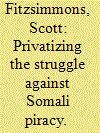

|
|
|
|
|
| Publication |
2013.
|
| Summary/Abstract |
Pirate attacks against commercial vessels in the Western Indian Ocean and nearby seas reached an unprecedented level in 2011. Despite concerted efforts by the international community and shipping companies to address this threat by conducting naval patrols and equipping commercial vessels with non-lethal defenses, the frequency of pirate attacks continues to increase. The general ineffectiveness of existing anti-piracy measures has sparked interest in expanding the use of armed private security contractors to protect commercial vessels from pirate attacks. This article argues that armed private security contractors can, indeed, enhance the security of commercial vessels because these actors can provide onsite protection for commercial vessels, which should allow them to respond very quickly to pirate attacks, and because these actors are willing to use deadly force against pirates. However, this article also argues that expanding the use of these actors may increase the degree of violence used during pirate attacks, pose threats to the safety of innocent civilians, and violate a number of domestic and international laws.
|
|
|
|
|
|
|
|
|
|
|
|
|
|
|
|
| 13 |
ID:
097105
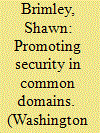

|
|
|
|
|
| Publication |
2010.
|
| Summary/Abstract |
Over the last several years, it has become apparent that the domains facilitating all international interaction-sea, air, space, and cyberspace-are increasingly congested, contested, and complex. These domains constitute the connective tissue of an ever more interconnected international system. It should, therefore, come as no surprise that the level of activity and investment by both state and non-state actors is rapidly increasing. Satellites are being launched, submarines are being built, long-range aircraft procured, and powerful cyberspace capabilities are being maintained by states that only two decades ago were just beginning to employ rudimentary computer systems. Non-state actors, ranging from pirates off Somalia to cyber "hacktivists" to the growing number of commercial players that own and operate satellites, further complicate this landscape.
|
|
|
|
|
|
|
|
|
|
|
|
|
|
|
|
| 14 |
ID:
141052
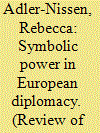

|
|
|
|
|
| Summary/Abstract |
National diplomacy is challenged by the rise of non-state actors from transnational companies to non-governmental organisations. In trying to explain these challenges, scholars tend to either focus on a specific new actor or argue that states will remain the dominant diplomatic players. This article develops an alternative Bourdieu-inspired framework addressing symbolic power. It conceptualises diplomacy in terms of a social field with agents (field incumbents and newcomers alike) who co-construct and reproduce the field by struggling for dominant positions. The framework is applied to the EU's new diplomatic service (the European External Action Service, EEAS), which is one of the most important foreign policy inventions in Europe to date. I show that the EEAS does not challenge national diplomacy in a material sense – but at a symbolic level. The EEAS questions the state's meta-capital, that is, its monopoly of symbolic power and this explains the counter-strategies adopted by national foreign services. The struggles to define the ‘genuine’ diplomat reveal a rupture in the European diplomatic field, pointing towards a transformation of European statehood and the emergence of a hybrid form of diplomacy. A focus on symbolic power opens up new avenues for the study of transformations of authority in world politics.
|
|
|
|
|
|
|
|
|
|
|
|
|
|
|
|
| 15 |
ID:
171323
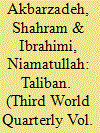

|
|
|
|
|
| Summary/Abstract |
Iran has pursued a highly contradictory policy towards Afghanistan. On the one hand, it became a significant beneficiary of the overthrow of the Taliban regime by the US-led military intervention in 2001 in Afghanistan. The new Afghan government established cordial ties with Iran, allowing it to expand its political, economic and cultural influence in the country. Yet Iran has also provided significant support to the Taliban in its campaign to violently upend the political, social and economic processes in the country. This article examines the underlying domestic and regional security dynamics that contribute to this contradictory behaviour. It offers an assessment of how tensions between the United States and the Islamic Republic, as well as Tehran’s growing threat perception following the rise of the Islamic State – Khorasan in 2014, impact on Iran’s policy towards the Taliban. The paper argues that Tehran views the Taliban as an instrument to disrupt the influence of other actors in Afghanistan. The instrumentalisation of the Taliban, however, is likely to be counterproductive for Iranian security in the long run as it contributes to Afghanistan’s instability and insecurity and undermines Iran’s own long-term interests.
|
|
|
|
|
|
|
|
|
|
|
|
|
|
|
|
| 16 |
ID:
139325
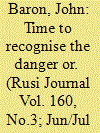

|
|
|
|
|
| Summary/Abstract |
As policy-makers around the globe come to terms with an altogether more complicated international landscape, marked by the rise and increasing assertiveness of new powers and the growing importance of non-state actors, it is ever-more important that foreign policy is underpinned by robust strategic thinking. In this article, John Baron explores the costs of cuts to the Foreign Office and defence budgets, deploring the adverse effects not only on the UK's hard and soft power, but also on its strategy-making.
|
|
|
|
|
|
|
|
|
|
|
|
|
|
|
|
| 17 |
ID:
094530
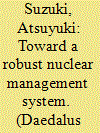

|
|
|
| 18 |
ID:
114696
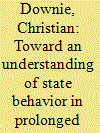

|
|
|
|
|
| Publication |
2012.
|
| Summary/Abstract |
Many of the most significant international treaty negotiations take years, and sometimes decades, to conclude. The international climate negotiations, trade negotiations, and law of the sea negotiations are all examples. Yet, notwithstanding their common occurrence and importance, prolonged international negotiations are not well understood. In these negotiations, state preferences are not fixed, but fluid, as negotiating positions change. This temporal dimension of prolonged negotiations is insufficiently captured by existing theories of international negotiations, which, by virtue of their focus on individual negotiation outcomes at one point in time, tend to be static in their analysis. This article combines an analysis of existing theories of international negotiations with the findings of an empirical study of the climate change negotiations. It reveals a series of internal and external factors distinct to prolonged international negotiations, emphasizes the importance of the temporal dimension, and explains how and why the negotiating positions and the type of agreements states are prepared to sign change over time. Building on these variables, state behavior in prolonged international negotiations can be usefully conceived of as (at different points in time) either an immature or mature game, in which strategic opportunities arise at different phases of the game for networked actors to constructively influence state behavior. Eight strategies are suggested that traditionally weak actors can employ to steer prolonged international negotiations toward their preferred outcome.
|
|
|
|
|
|
|
|
|
|
|
|
|
|
|
|
| 19 |
ID:
186089
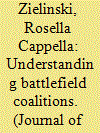

|
|
|
|
|
| Summary/Abstract |
Battlefield coalitions are distinct warfighting collectives. They are the groups of forces created by states that are formal allies, states that have no written agreement to cooperate militarily, non-state actors, or some combination thereof to engage in combat at the operational and tactical levels of war. They are also increasingly common belligerents in war, but there is little scholarship on their creation, composition, operation, and achievements. This special issue begins the necessary work of improving our understanding of battlefield coalitions, providing new insight into their nature and capabilities, as well as the military and political consequences of their combat operations.
|
|
|
|
|
|
|
|
|
|
|
|
|
|
|
|
| 20 |
ID:
092876
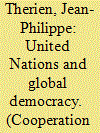

|
|
|
|
|
| Publication |
2009.
|
| Summary/Abstract |
This article shows that the idea of global democracy has been a driving force in UN discourse and policies for the past two decades. In the first part, we use official rhetoric to explain that the promotion of global democracy by the UN rests on a particular set of values and beliefs. In an analysis that parallels the interpretation proposed by cosmopolitan democratic theorists, UN leaders argue that international governance must be democratized in order to reflect the recent reconfiguration of political forces. We then examine how UN ideas are put into practice through global public policies. Structured in line with the distinction between input- and output-based legitimacy, this second part demonstrates how UN policies foster greater participation by non-state actors in the organization's deliberations and operations. The article suggests that the UN is an effective intellectual actor. By promoting civil society's greater involvement in world politics, the discourse and policies of the UN have indeed succeeded in advancing the idea of a democracy 'without borders'
|
|
|
|
|
|
|
|
|
|
|
|
|
|
|
|
|
|
|
|
|